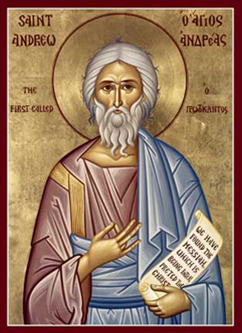The First Called

The Holy Apostle ANDREW THE FIRST-CALLED was the first of the Apostles to follow Christ. St. John the Evangelist tells us that Andrew had been a disciple of John the Baptist and had heard how the latter called Jesus “the Lamb of God” (John 1:36). He straightway followed Christ, and became His first disciple. After spending the day with Jesus, the first thing the First-called of the Apostles does is go and tell his brother Peter: "We have found the Messiah!" The Gospel simply tells us, "And he brought him to Jesus" (John 1:42). Andrew was on his own humble quest for the truth, and when the Truth came before him, he recognized Him and never looked back. After the Ascension of Christ, each Apostle went to teach to a different place to proclaim the Good News. Various early traditions recount St. Andrew's missionary travels throughout Eastern Europe: what is now Greece, Romania, Ukraine, and Russia - where he stayed and taught and endured many toils and afflictions for the Gospel. The Apostle Andrew later visited Byzantium, on which site the city of Constantinople was built, founding the Church of Christ. Our "first among equals," the Ecumenical Patriarch of Constantinople, is known as the successor of St. Andrew. St. Andrew’s life speaks of the many miraculous healings, and even of raising of the dead that were accomplished in various cities through the prayers of the Apostle; it likewise speaks of the cruel persecutions he endured. A diagonal cross in the shape of the letter X was chosen as his means of execution. To prolong his suffering, the Proconsul Aegeates ordered that, rather than being nailed to the cross, he be tied to it hand and foot. One version of St. Andrew's martyrdom puts these beautiful words to the Holy Cross on his lips: "O good Cross, made beautiful by the body of my Lord! So long desired, so anxiously loved, so unceasingly sought after, and now at last ready for my soul to enjoy! Take me from amidst men, and restore me to my Master, that by thee He may receive me, who by thee redeemed me."
Le Premier Appelé
André, le glorieux apôtre du Christ, le PREMIER APPELÉ, est le frère du Saint Apôtre Pierre. C’est un assoiffé de Dieu, qui a entendu la prédication de Jean le Baptiste, a sans doute reçu son baptême de pénitence et est devenu l’un de ses disciples. Or un jour, après avoir baptisé Jésus, Jean Le Précurseur s’entretient avec André et son autre disciple Jean l’Évangéliste et, leur montrant Jésus qui passe non loin de là, il leur dit : « Voici l’Agneau de Dieu!» (Jn 1, 35) ; il Le suit et ne le quitte plus. Il se précipite alors chez son frère Simon et lui dit : « Nous avons trouvé le Messie ! » (Jn 1, 41), puis le conduit auprès de Lui. André fut le premier à reconnaître le Christ et c’est lui qui l’annonce à celui qui devait devenir le chef du chœur des Apôtres, c’est pourquoi il reçoit le surnom de PREMIER APPELÉ. André sert souvent d’intermédiaire : il présente son frère Simon à Jésus ; amène le jeune garçon portant les cinq pains et les deux poissons à Jésus, lors de l’épisode de la multiplication, et lorsque des Grecs veulent rencontrer Jésus, c’est encore à lui qu’ils s’adressent. André part prêcher l’Évangile, autour des côtes de la mer Noire, en Bithynie, à Éphèse, en Mésopotamie, en Ukraine actuelle, en Thrace, à Byzance et finalement en Achaïe (région au nord du Péloponnèse), où il finit crucifié. La croix de supplice sur laquelle il est crucifié est en forme de X, ce qui lui donne le nom de croix de Saint-André. Lors de ses nombreux voyages, le PREMIER APPELÉ est soumis à des privations de toute sorte, des maladies, des dangers, etc. Mais partout où il passe, le Saint-Esprit l’accompagne, parle par sa bouche, accomplit prodiges et guérisons, lui donne la patience et la joie dans les épreuves. Cependant, Saint-André ne cherche ni à fuir ni à se défendre, mais endure tout avec patience en imitant son Maître, l’Agneau de Dieu. Saint-André est considéré comme le fondateur de l’Église de Constantinople, siège du Patriarcat œcuménique.